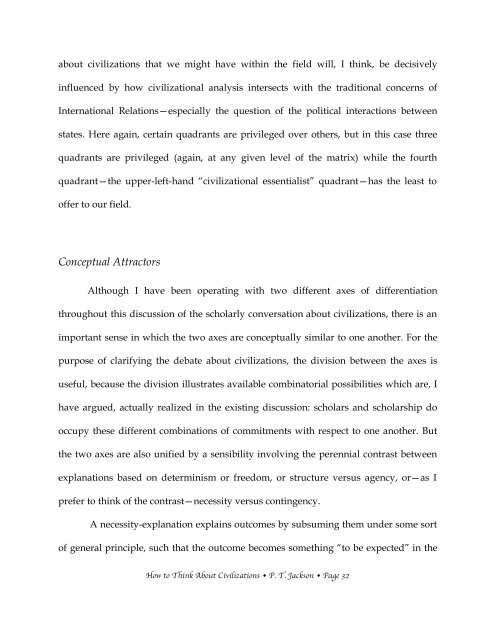How to Think About Civilizations - The Watson Institute for ...
How to Think About Civilizations - The Watson Institute for ...
How to Think About Civilizations - The Watson Institute for ...
Create successful ePaper yourself
Turn your PDF publications into a flip-book with our unique Google optimized e-Paper software.
about civilizations that we might have within the field will, I think, be decisively<br />
influenced by how civilizational analysis intersects with the traditional concerns of<br />
International Relations—especially the question of the political interactions between<br />
states. Here again, certain quadrants are privileged over others, but in this case three<br />
quadrants are privileged (again, at any given level of the matrix) while the fourth<br />
quadrant—the upper-left-hand “civilizational essentialist” quadrant—has the least <strong>to</strong><br />
offer <strong>to</strong> our field.<br />
Conceptual Attrac<strong>to</strong>rs<br />
Although I have been operating with two different axes of differentiation<br />
throughout this discussion of the scholarly conversation about civilizations, there is an<br />
important sense in which the two axes are conceptually similar <strong>to</strong> one another. For the<br />
purpose of clarifying the debate about civilizations, the division between the axes is<br />
useful, because the division illustrates available combina<strong>to</strong>rial possibilities which are, I<br />
have argued, actually realized in the existing discussion: scholars and scholarship do<br />
occupy these different combinations of commitments with respect <strong>to</strong> one another. But<br />
the two axes are also unified by a sensibility involving the perennial contrast between<br />
explanations based on determinism or freedom, or structure versus agency, or—as I<br />
prefer <strong>to</strong> think of the contrast—necessity versus contingency.<br />
A necessity-explanation explains outcomes by subsuming them under some sort<br />
of general principle, such that the outcome becomes something “<strong>to</strong> be expected” in the<br />
<strong>How</strong> <strong>to</strong> <strong>Think</strong> <strong>About</strong> <strong>Civilizations</strong> • P. T. Jackson • Page 32
















